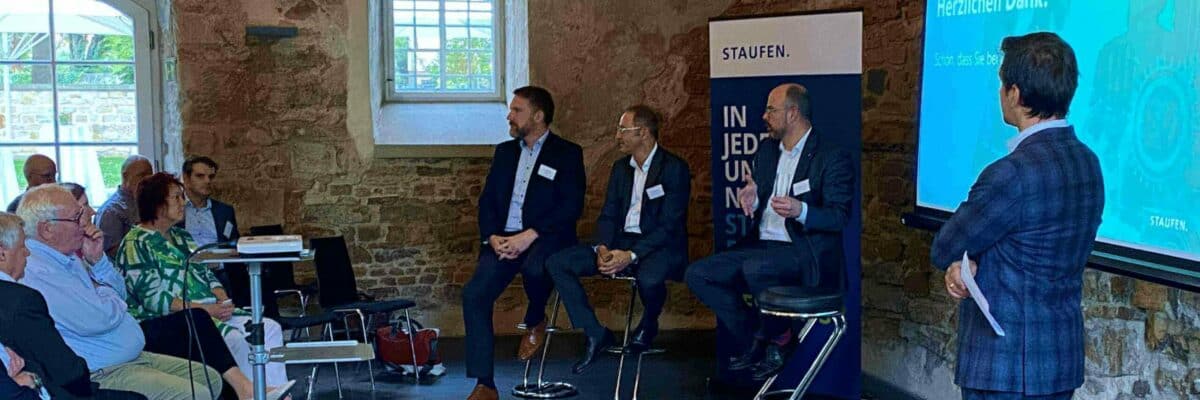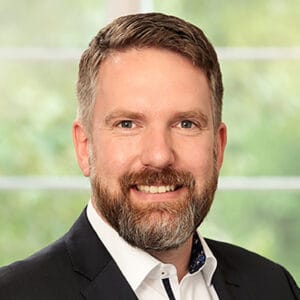
At first glance the subject of sustainability almost seems to be taking a back seat: overshadowed as it is by the current economic challenges of supply bottlenecks and increasing cost of materials and energy which now seem to define our everyday life. But alongside increasingly demanding compliance with the latest laws and standards, it also contains answers to a series of questions on the challenges currently shaping markets. Thus sustainability now means far more than C02-emissions and is the pace-setter for global footprint and supply chain management, as well as efficient and waste-free use of personnel, materials and energy. The particular challenge at this time is to be found in strategic positioning and operationalization of concealed objectives so that not only can standards be met, but costs and competitive advantages can be achieved.
In the evening of the 14th July everything in Schloss Köngen was set to “green”: the STAUFEN MANAGEMENT DIALOG, this time the industry meeting for mechanical and plant engineering focused on the strategic integration of sustainability as an opportunity to increase future viability and competitiveness. About 60 business leaders and experts gathered to exchange ideas.
The green transformation as the pace-setter
Björn Falk, Sector Manager Mechanical and Plant Engineering at Staufen AG, kicked off with insights into the findings of the Staufen survey “Green Transformation in Mechanical and Plant Engineering” and the implications derived from the survey. The mechanical and plant engineering industry segment will drive ecological transformation forward. Key factors in this process are the economic viability of the measures announced as well as rigorous anchoring in corporate policy and management strategy.
Business leaders and guest speakers Dr. Tim Nikolaou, Managing Director and COO of Oskar Frech GmbH + Co. KG and Dr. Thomas Schneider, Managing Director Research & Development of TRUMPF Werkzeugmaschinen SE & Co.KG presented a successful pathway for successfully moving traditional system boundaries and how, if the strategy was clearly focused, sustainability and economic efficiency are no longer in conflict with each other.


The green transformation is becoming the pace-setter for global footprint, supply chain management, and efficient use of personnel, materials, and energy.
Dr. Björn Falk, Sector Manager Mechanical and Plant Engineering, Staufen.AG
Sales support is transitioning from good partnership to a growth strategy jointly managed with the customer.
dr. Thomas schneider, Managing Director Research & Development of TRUMPF Werkzeugmaschinen SE & Co.KG
„Equipment as a Service“
Dr. Thomas Schneider presented the concept “moving system boundaries with “equipment as a service” in the machine tool industry”. At TRUMPF the idea of providing the customer not only with a product but also with a comprehensive service lies behind “equipment as a service”. This is of particular importance and relevance with regard to the long life-cycle of the machines. Once installed in the customer’s workshop, the machine is controlled remotely. Control by an expert guarantees that the machine is used to the full extent of its capabilities.
The reorientation to the circular economy and the acceptance of greater responsibility in the value creation process, even in the customer’s premises, are also subjects of particular importance to TRUMPF. More sustainable products make a positive contribution for all of us as well as the next generation. Dr. Schneider has come to the conclusion that
Why does sustainability need movers and shakers?
Dr. Nikolaou took up this question in his lecture. Leaving the best possible living conditions for the generations that follow has always been high on the list of priorities of the family company Oskar Frech GmbH.
The first steps were taken at the company in 2015 in the form of an energy audit which produced some leads on future potentials. “But acting sustainably needs more than just energy management” explained Dr. Nikolaou. A concept was therefore developed which included social responsibility and economic activity as well as sustainable resource planning and the protection of the climate and environment. Profitability and competitiveness are also considered at every stage.
In Dr. Nikolaou’s opinion “Energy prices will increase further and stabilize at a high level. The environmental surcharges for CO2 neutral purchasing will also increase. Compliance with national and EU requirements on climate protection will also entail challenges for the “near” future. “Therefore reducing consumption must always take the top spot on the agenda,” stated Dr. Nikolaou. “Mark Twain once said “There is no elevator to success” – you have to use the stairs”. This is equally true for the success and sustainability of our company.”
Recognizing signs of the times
Delegates had the opportunity to wind down in the evening with an open air “flying buffet” for everyone and to use the opportunity to discuss the challenges and solutions inherent in the cost-efficient implementation of their sustainability strategy.
It was a great evening and gave us much to think about” was how Thomas Häusel, Division Manager Lifting Technology, Carl Stahl Hebetechnik GmbH described the evening. “You have to take time out to look into the future”. Dr. Alexander Schliessmann, Chief Technology Officer, FORCAM GmbH and one of the delegates, summarized the issue by saying “Companies that recognize the signs of the times and come to understand their social responsibility are acting not only sustainably but are also financially astute and are role models for our society”.




